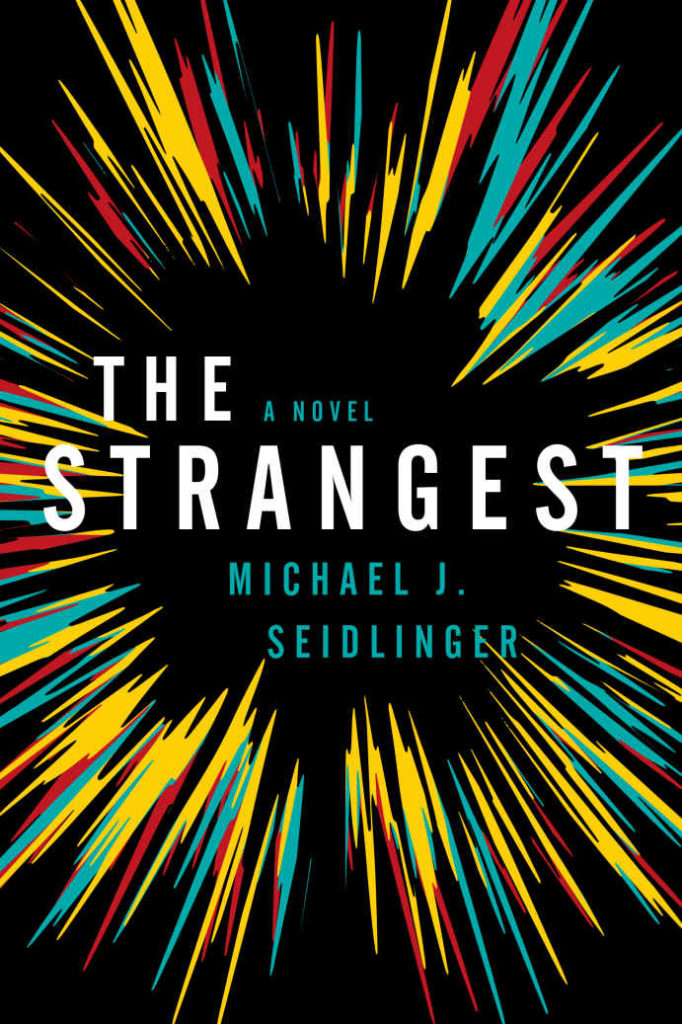
by Laurance Friend

Laurance Friend: Did you have to choose between coffee and suicide this morning? Are you really alive?
Michael J. Seidlinger: Truth is I’m already dead and the only thing keeping my body from rotting away is coffee, lots and lots of coffee. Dead is better because you don’t have to give a shit about anything but what keeps you hungry and interested. Meaning books.
LF: Your latest book is The Strangest, a modern take on Albert Camus’s, The Stranger. In what ways does the modern way of life have an impact in your version?
MJS: The most immediate difference is the use of social media. It’s an integral part of Zachary, the main character’s, life. You could say he lives online, and the life led offline is pathetic, even miserable, if viewed and judged by others. The “strangeness” of his life is how he chooses to (dis)engage with it, compartmentalizing every emotion and whim. The book takes place in the modern-day, assumed to be in the US, so there are also lots of stores, American football, and numerous drunken parties. I think it was in the Kirkus review, where I heard it being compared to Fight Club in terms of its setting, the locales Zachary navigates… and yeah, my explanation of Zachary’s external world wouldn’t be far off.
LF: You recently did a social experiment based on the book, letting social media dictate your actions, what kind of crazy stuff went down, and did you learn anything?
MJS: No, and that’s what might be the most insane part about it. It was all very stressful, essentially having to color my hair blonde, have to do some ballet moves, etc, but the entire experiment was actually quite… complacent. I was surprised by the response; I was worried that it wouldn’t take hold. Mainly due to the fact that social media is crowded these days and more so on Facebook than Twitter, underlying algorithms dictate a post’s visibility. It’s not just who’s online at the time of posting anymore. It’s not just about how many friends you have. It’s about how your post is processed by the platform’s structure. I worried that my posts would fly under the radar. Somehow they didn’t, so okay, maybe I did learn something from the experiment: I’m still capable of being surprised and there’s always more to learn about social media. Oh, people told me I looked good with blonde hair but—fuck that—I’m not going back. Accept me for who I am, not my hair color.
LF: I haven’t gotten to read all of your books, but know your catalog is quite varied. What areas have you explored and which was the toughest to write?
MJS: I’ve explored the transgressive, the surreal, and lately, the YA/New Adult world. I’ve just finished a screenplay and before that, a memoir. I’d say of the work that’s been published (or at least sold/to-be-published), the YA one, “Falter Kingdom,” was the toughest due to the necessity to write for a specific audience. Normally, I follow what I feel the book should be, rarely paying attention to things like demographics. It was different from the YA and posed a unique challenge. Of the work that’s not yet published, hasn’t been sold, or in the case of the memoir, I haven’t even started shopping it around yet, the most difficult was the screenplay. It’s quite difficult writing not from inside a character’s world or mind; when you’re writing what is essentially what the camera sees, things get very objective and very difficult, streamlined, really quickly. When you grow used to writing from within the mind of a character, stepping outside of it poses a unique, and exceedingly difficult, challenge. Man, writing that screenplay sent me into a real and present depression. Doubting myself as a writer, all of that stuff. Real bad. But then again, we all fall into those at times.
LF: I thought The Fun We’ve Had was a deeply surreal and symbolic book. It seems to speak from somewhere in us all, something on the edge of every thought. What was your inspiration for the book? Did you have to become a monk to voice such a void?
MJS: So The Fun We’ve Had happened differently from how I usually begin a novel. Cameron Pierce, editor of Lazy Fascist Press, emailed me the cover of the book as you see it today, no adjustments—the coffin, the young girl and the old man, the greenish sea, everything—with the prompt to write a novel about what this might be. He didn’t give me any details other than the cover and a loose deadline. It’s the first, and really the only, time I’ve ever written something via a prompt. Typically I have the idea and the general outline of something and it’s all very planned, from structure to narrative arc, but with The Fun We’ve Had, I had the cover and the title. I had to figure out what it could be. The end result, yeah, neither Cameron nor I expected it to become a surrealistic tale about dead lovers floating in a coffin on a purgatorial sea. I went in blind, but was I a monk? No. A blind monk? Maybe. What matters is that it’s done and the process was truly fun and very different.
LF: What would you consider the highlights of your life as a writer? What keeps you writing?
MJS: The elusiveness of a good idea. I’m always brainstorming, looking for possibilities. Inspiration keeps me writing. A great idea decides the way. As a writer, I need to feel every word or else, there’s no point. If it doesn’t feel right or feel like anything, it shouldn’t exist. Never waste a word.
LF: Who are your literary heroes and what peers do you recommend for others to read?
MJS: Oh man..there are so many literary heroes out there. I’ll just name the first three that pop up in my head: Isaac Fitzgerald of Buzzfeed Books, Lidia Yuknavich, author of The Small Backs of Children, and Dennis Cooper, author of Zac’s Control Panel. So many good people out there… I could go on a namedrop spree. But I won’t. They are the type of lit citizens that go above and beyond the call of duty (don’t you dare think of the videogame), promoting the work of others and essentially keeping community morale high.
Same goes for who I’d recommend. There’s so much out there. So many amazing, unique voices that I feel it would be debilitating to start up a list. So same rule of three: Joshua Jennifer Espinosa, Matthew Bookin, and Elle Nash. Three that come immediately to mind. But yeah, could go on a namedrop spree. Won’t, but seriously could.
LF: What’s a typical day in the life of Mr. Seidlinger?
MJS: Wake up at 5:55 AM, go to the day gig. Leave at 3:30-4pm, fit in a workout before sitting down at the computer and going through correspondence, then any/all editing needed for CCM and Electric Lit; afterward, I spend an hr or two on my own writing, then correspondence again. Some “free time” to read or watch something. Then correspondence. I think I sleep at some point, then correspondence. Correspondence = the emails, they never end.
LF: You wake up a cockroach one day, what is it you do?
MJS: I take a selfie and post it on social media.
LF: You run a publishing press known as Civil Coping Mechanisms and have helped bring a great deal of work into the world. What’s the origin story? Have any favorite titles?
MJS: The press started as an intended art collective—think a press, record label, and more all rolled into one—by a guy, and friend, named Gabe Cardona, but things never picked up on any other front except the publishing part so it sort of organically became a small press. He backed away towards the end of 2013, beginning of 2014, and CCM was set to shutter but since I had already been helping out with operations, I stepped in to save it. At the beginning of 2015, CCM merged with Entropy and we haven’t looked back since—things have remained active and the community surrounding the press and magazine has a lot of amicable energy, the sort that inspires as much as it motivates; so yeah, perhaps the “art collective” part never disappeared; it simply manifested in a different way. Nope, as publisher, I’m the “parent” or “papa” of all the books published. I favor them all equally; each book is so different, much like its author’s voice, so there’s a lot to love about any CCM title you might pick up. I’d like to think that I’m a good “parent,” or at least trying my best at being a “good parent.”
LF: What is the super power you most desire?
MJS: Mind control, but I wouldn’t be like Kilgrave from Marvel’s Jessica Jones; I’d use the power to control MY MIND. It gets exhausting having all these scattered thoughts and doubts and so forth. Being able to control every damn thought would be amazing.
LF: Do you still feel alive?
MJS: Nope. Dead, remember? RIP. Every day is the same.
PURCHASE THE STRANGEST & SEIDLINGER’S OTHER NOVELS HERE.
About the interviewer:
Laurance Friend is a freelance travel journalist, digital vagabond, truth-seeker, and poet under the moniker of NOBODY IMPORTANT. His first collection, SELF-LOATHING & OTHER FORMS OF CYNICISM is available to purchase around the globe in digital format. You can better follow his adventures on Facebook, Instagram, and Twitter.
This post may contain affiliate links. Further details, including how this supports the bizarro community, may be found on our disclosure page.

